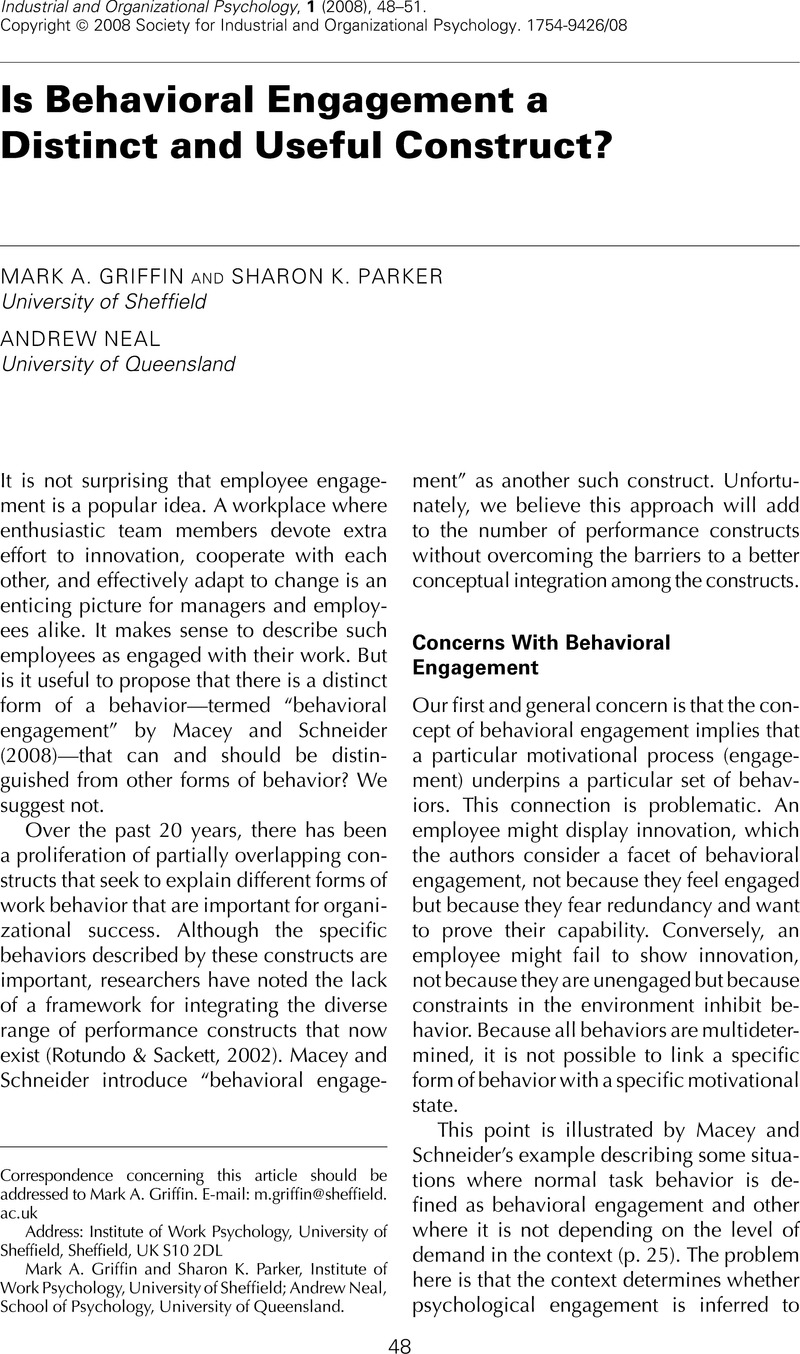Crossref Citations
This article has been cited by the following publications. This list is generated based on data provided by Crossref.
Macey, William H.
and
Schneider, Benjamin
2008.
Engaged in Engagement: We Are Delighted We Did It.
Industrial and Organizational Psychology,
Vol. 1,
Issue. 1,
p.
76.
Litten, Joyce P.
Vaughan, Amy G.
and
Wildermuth, Cristina De-Mello-E-Souza
2011.
The Fabric of Engagement: The Engagement and Personality of Managers and Professionals in Human and Developmental Disability Services.
Journal of Social Work in Disability & Rehabilitation,
Vol. 10,
Issue. 3,
p.
189.
Shuck, Brad
2011.
Integrative Literature Review: Four Emerging Perspectives of Employee Engagement: An Integrative Literature Review.
Human Resource Development Review,
Vol. 10,
Issue. 3,
p.
304.
Kelemen, Mihaela
Nair, Nisha
and
Vohra, Neharika
2012.
The concept of alienation: towards conceptual clarity.
International Journal of Organizational Analysis,
Vol. 20,
Issue. 1,
p.
25.
Cole, Michael S.
Walter, Frank
Bedeian, Arthur G.
and
O’Boyle, Ernest H.
2012.
Job Burnout and Employee Engagement.
Journal of Management,
Vol. 38,
Issue. 5,
p.
1550.
Griffiths, Mark D.
and
Karanika-Murray, Maria
2012.
Contextualising over-engagement in work: Towards a more global understanding of workaholism as an addiction.
Journal of Behavioral Addictions,
Vol. 1,
Issue. 3,
p.
87.
Shuck, Brad
Ghosh, Rajashi
Zigarmi, Drea
and
Nimon, Kim
2013.
The Jingle Jangle of Employee Engagement.
Human Resource Development Review,
Vol. 12,
Issue. 1,
p.
11.
Liao, Fang-Yi
Yang, Liu-Qin
Wang, Mo
Drown, Damon
and
Shi, Junqi
2013.
Team–Member Exchange and Work Engagement: Does Personality Make a Difference?.
Journal of Business and Psychology,
Vol. 28,
Issue. 1,
p.
63.
López-Domínguez, Mercedes
Enache, Mihaela
Sallan, Jose M.
and
Simo, Pep
2013.
Transformational leadership as an antecedent of change-oriented organizational citizenship behavior.
Journal of Business Research,
Vol. 66,
Issue. 10,
p.
2147.
Alfes, Kerstin
Truss, Catherine
Soane, Emma C.
Rees, Chris
and
Gatenby, Mark
2013.
The Relationship Between Line Manager Behavior, Perceived HRM Practices, and Individual Performance: Examining the Mediating Role of Engagement.
Human Resource Management,
Vol. 52,
Issue. 6,
p.
839.
Keating, Lauren A.
and
Heslin, Peter A.
2015.
The potential role of mindsets in unleashing employee engagement.
Human Resource Management Review,
Vol. 25,
Issue. 4,
p.
329.
Bailey, Catherine
Madden, Adrian
Alfes, Kerstin
Fletcher, Luke
Robinson, Dilys
Holmes, Jenny
Buzzeo, Jonathan
and
Currie, Graeme
2015.
Evaluating the evidence on employee engagement and its potential benefits to NHS staff: a narrative synthesis of the literature.
Health Services and Delivery Research,
Vol. 3,
Issue. 26,
p.
1.
Kincl, Laurel D.
Anton, Dan
Hess, Jennifer A.
and
Weeks, Douglas L.
2016.
Safety voice for ergonomics (SAVE) project: protocol for a workplace cluster-randomized controlled trial to reduce musculoskeletal disorders in masonry apprentices.
BMC Public Health,
Vol. 16,
Issue. 1,
Eldor, Liat
2016.
Work Engagement.
Human Resource Development Review,
Vol. 15,
Issue. 3,
p.
317.
Nguyen, Cuong
Tahmasbi, Nargess
de Vreede, Triparna
de Vreede, Gert-Jan
Oh, Onook
and
Reiter-Palmon, Roni
2016.
Blurring the Boundaries Through Digital Innovation.
Vol. 19,
Issue. ,
p.
283.
Delaney, Molly L.
and
Royal, Mark A.
2017.
Breaking Engagement Apart: The Role of Intrinsic and Extrinsic Motivation in Engagement Strategies.
Industrial and Organizational Psychology,
Vol. 10,
Issue. 1,
p.
127.
Shuck, Brad
Osam, Kobena
Zigarmi, Drea
and
Nimon, Kim
2017.
Definitional and Conceptual Muddling: Identifying the Positionality of Employee Engagement and Defining the Construct.
Human Resource Development Review,
Vol. 16,
Issue. 3,
p.
263.
Chen, Chwen Jen
and
Keong, Melissa Wei Yin
2017.
Affording inclusive dyslexia-friendly online text reading.
Universal Access in the Information Society,
Vol. 16,
Issue. 4,
p.
951.
Schmitt, Antje
Rosing, Kathrin
Zhang, Stephen X.
and
Leatherbee, Michael
2018.
A Dynamic Model of Entrepreneurial Uncertainty and Business Opportunity Identification: Exploration as a Mediator and Entrepreneurial Self-Efficacy as a Moderator.
Entrepreneurship Theory and Practice,
Vol. 42,
Issue. 6,
p.
835.
Tsai, Shu-pei
2018.
Innovative behaviour of knowledge workers and social exchange attributes of financial incentive: implications for knowledge management.
Journal of Knowledge Management,
Vol. 22,
Issue. 8,
p.
1712.



